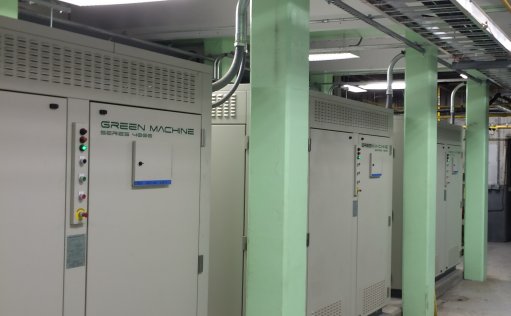
GENERATING ELECTRICITY The ElectraTherm Power+Generator is distributed in South Africa by Alt.EnerPro
Through the process of feeding off heat from burners and boilers at temperatures as low as between 77 °C and 116 °C, the ElectraTherm Power+Generator distributed in South Africa by energy projects and professional services company Alt.EnerPro can generate up to 110 kWe of fossil fuel-free electricity.
The ElectraTherm Power+Generator, manufactured in the US, uses waste heat power to generate electricity through the Organic Rankine Cycle (ORC) process. This process involves hot water heating a working fluid into a pressurised vapour. As the vapour expands, it drives the generator’s twin screw power block, which spins an electric generator and produces power.
ORC technology is a source of power generation from low temperature waste heat streams. Such heat streams are commonly found on reciprocating engines, where an ORC generator can increase engine performance and decrease fuel consumption by converting the engine’s jacket water and exhaust into additional electricity for the site.
A typical engine runs at about 35% efficiency, resulting in substantial waste heat between the jacket water and the exhaust.
Boilers, burners and reciprocating engine applications are common, and include prime power production in remote areas, island and developing nations, biogas gensets such as landfill and wastewater treatment plants, and renewable biofuels.
ElectraTherm Technology Differentiation
ORC works like a refrigerator running in reverse, where heat flows across a difference in temperature, which generates power. The ORC replaces water and steam associated with typical Rankine cycles with alternative low-boiling point fluids to successfully use heat, which is typically at temperatures too low to drive a steam engine.
The power block of the ElectraTherm waste heat power generators – a twin screw expander – represents a great change from radial or axial turbine technologies, providing a more cost effective, robust machine to generate fuel-free and emissions-free electricity from a variety of heat sources.
This enables the power generator’s ORC technology to work effectively and economically in low temperature waste heat markets.
The twin screw expander offers distinct advantages for low temperature small-scale ORCs, such as simple and compact design, low speed operation with the ability to handle heat input variations and dual phase flow of the working fluid, significant part load capability, and no gear box or oil pump. These are particularly advantageous in low temperature waste heat streams such as reciprocating engine jacket water.
This level of heat rejection is common to exhaust stack gases from virtually all combustion processes, such as ovens, kilns, furnaces, incinerators, thermal oxidisers, boilers and diesel, natural gas or biomass-powered reciprocating engines.